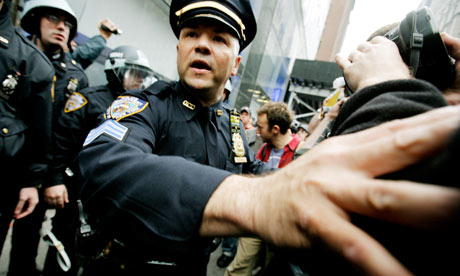I was surprised two weeks ago to walk into my local TD Bank, on Greenwich Avenue in the West Village, New York to find that the security officer who was usually standing by, on alert, had been replaced by a uniformed, armed, radio-carrying New York Police Department officer, Officer Battle. I confirmed from him that he was, in fact, an NYPD officer -- and was working part-time for TD bank.
Of course, this raised red flags for me. After the violent crackdown on Occupy Wall Street in November of 2011, when that group was having some of its most significant successes in protests and actions that challenged private banks and Wall Street institutions, many wondered what had motivated the unexpected aggression against protesters by local police officers tasked, at least overtly by municipal law, with upholding their first amendment rights.
The NYPD became, at the time, coordinated in its crackdown once Occupy had started to target banks. Was there a relationship behind the scenes of which we were unaware?
Chase bank had made a gift of $4.6m to the Police Foundation -- boasting on its website that this "was the largest" in that group's history, and hoping that the money would allow the NYPD to "strengthen security." This police fund, as well as some details of a Rudi Giuliani-initiated program by which police officers had been hired by corporations, created a brief stir online.
But were Chase, TD, Bank of America and others, which had been targeted by activists, actually now employing our police forces directly?
The answer is yes. A non-transparent program called "Paid Detail Unit" has been set up so that private corporations are actually employing NYPD officers, who are in uniform and armed. The difference is that when these "public servants" are on the payroll of the banks, they are no longer serving you and the impartial rule of law in your city -- despite what their uniforms and badges imply. Neither New York Councilwoman Christine Quinn's press office nor an NYPD's spokesman responded to my queries regarding this program.
I went to a second TD Bank, on Third Avenue in Manhattan. There was NYPD Officer Kearse, also armed and in uniform. I asked him who paid him to watch the bank: he confirmed that the Paid Detail Unit did so. The bank pays fees directly to the NYPD, and the NYPD then pays him, after taking a cut. Kearse works at the bank 6.5 hours per shift, twice a month. That's not much, he said, compared to many NYPD officers "who do lots more."
"What would you do if there were protesters in this bank branch?" I asked.
"I'd remove them," he said.
"What if there were a conflict of interest between what the bank wanted him to do and what the rule of law was for citizens?" I asked.
He did not reply.
I asked a manager at the branch what the role of the NYPD officer was in the bank. She said, "All I know is he is there to watch us." She called a more senior manager to answer the rest of my questions, Patrick O'Toole:
"They are New York City police officers off-duty, paid by the Paid Detail Unit," he said. This is a program "that various corporations are able to use to obtain off-duty police officers for whatever purpose they need them. The bank supplies every branch in New York City with an off-duty police officer."
In the event of a protest, I asked, whom would the officer be working for? The bank, or the city and the citizens of New York? "I wouldn't know," he said, and referred me to TD Bank corporate security. "He's working under us when he's here: we pay Paid Detail and the NYPD writes the checks."
Crooksandliars.com shone rare light on the size of this program. According to that report, the city gets a 10% administrative fee, which, in 2011, amounted to $1.18m -- meaning that PDU wages netted NYPD officers a total of $11.8m, an amount which had doubled since 2002.
But who indemnifies these cops working for banks from lawsuits that might arise from possible illegal actions against citizens while working this kind of job? Not the banks, it turns out, but you the taxpayer. In other words, you pay the bill to protect that officer from lawsuits incurred if he breaks the law in protecting the bank.






